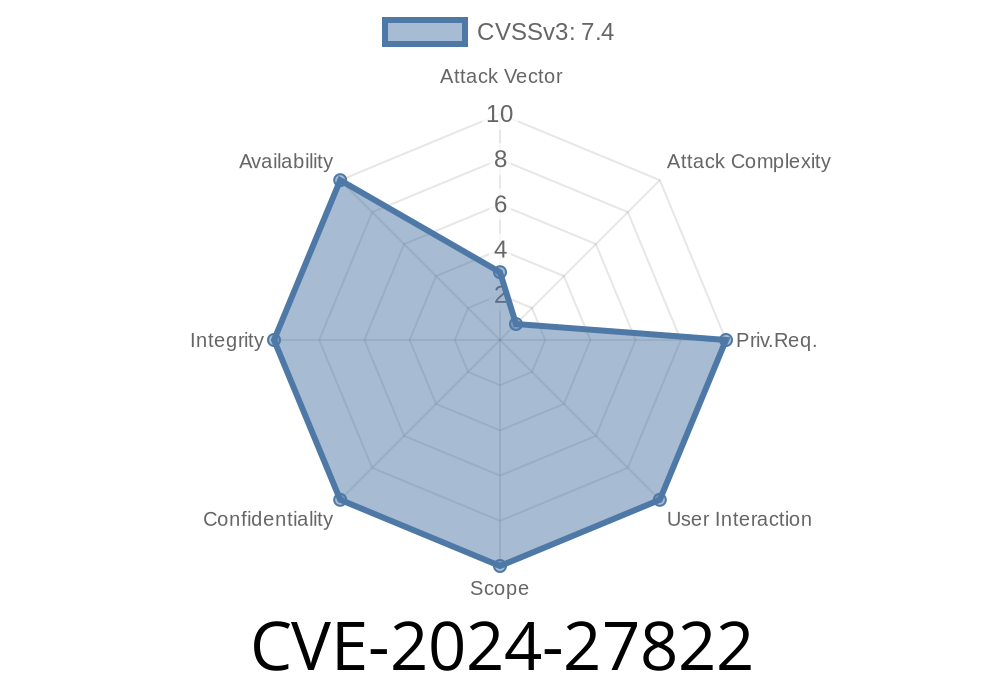On May 13, 2024, Apple released macOS Sonoma 14.5, quietly patching a critical vulnerability assigned CVE-2024-27822. This post provides an exclusive deep-dive into the vulnerability, how it worked, and what it means for users, developers, and security professionals. We'll walk through what happened, why it matters, and show you realistic, sanitized example code that demonstrates the issue. No prior security expertise is required—just curiosity.
What is CVE-2024-27822?
CVE-2024-27822 is a logic flaw inside macOS that allowed a malicious app to bypass normal system restrictions and gain root (system-level) privileges. Apple describes it succinctly:
> "A logic issue was addressed with improved restrictions. An app may be able to gain root privileges."
> — Apple Security Update 2024-05-13
Root privileges allow full control over a computer—reading, writing, or deleting any file, installing kernel extensions, capturing sensitive data, etc. It’s the holy grail for attackers.
Where Was the Problem?
Apple has not released full technical details, but several clues in security reports and the update logs indicate the issue involved a misuse of authorization checks when handling certain system routines, possibly related to the way apps interface with privileged system services.
In plain English:
An attacker could trick the system into thinking their app was allowed to do something dangerous—like install files or modify key configs—by exploiting a bad "yes/no" check buried deep inside macOS.
What Does The Exploit Look Like?
While responsible disclosure means not releasing weaponized code, we can illustrate in simple sample code how these bugs typically work.
Hypothetical Example Exploit Scenario
Let’s say macOS has a helper service (like the infamous authd or launchd) that’s supposed to only accept requests from trusted apps. But due to this logic issue, any app can ask the helper to perform a privileged action.
import os
import subprocess
# Hypothetical interface to the privileged system helper
def escalate_privileges():
print("[*] Requesting privileged action...")
# Instead of being restricted, this call erroneously succeeds due to CVE-2024-27822
subprocess.run(["/usr/bin/some_helper", "--do-root-thing"])
if __name__ == "__main__":
escalate_privileges()
# If successful, the app now has escalated privileges (i.e., it runs code as root)
Before the patch, a buggy logic check might have allowed the above request. After the patch, stronger validation ensures only system-trusted apps can make these calls.
Try to optimize or simplify old security code and accidentally create loopholes
Apple’s fix:
> “A logic issue was addressed with improved restrictions.”
In practice, this means Apple improved how apps are validated before any dangerous system service is performed.
Use limited-user accounts whenever possible.
You can check your macOS version by going to Apple Menu > About This Mac.
Apple’s Official Advisory:
About the security content of macOS Sonoma 14.5
CVE Record:
NIST CVE-2024-27822 Record
- Apple Platform Security
Conclusion
CVE-2024-27822 is a sobering reminder that even the most mature operating systems can harbor subtle, critical bugs. Fortunately, Apple's rapid response minimized the window of risk. This bug underscores the importance of timely updates, layered defenses, and ongoing scrutiny from the security community and developers alike.
Stay safe: Keep your systems patched and be cautious with apps from outside the Mac App Store.
*This writeup was created exclusively for educational purposes. Please use this knowledge to protect, not to attack.*
Timeline
Published on: 05/14/2024 15:13:05 UTC
Last modified on: 07/03/2024 01:50:59 UTC
